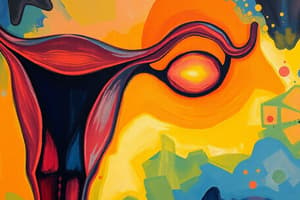Podcast
Questions and Answers
Describe the process of human reproduction, including the key steps and involved organs.
Describe the process of human reproduction, including the key steps and involved organs.
Human reproduction involves the fusion of a sperm cell and an egg cell, leading to the formation of a zygote. The key steps include fertilization, implantation, and embryonic development, which takes place in the uterus. The male reproductive system produces and delivers sperm, while the female reproductive system produces eggs, provides a suitable environment for fertilization, and supports fetal development.
Explain the role of hormones in human reproduction and how they regulate the reproductive process.
Explain the role of hormones in human reproduction and how they regulate the reproductive process.
Hormones play a crucial role in human reproduction by regulating the development and function of the reproductive organs, controlling the menstrual cycle, stimulating the production of sperm and eggs, and supporting pregnancy. Key hormones involved include follicle-stimulating hormone (FSH), luteinizing hormone (LH), estrogen, progesterone, and testosterone.
Discuss the importance of genetic diversity in human reproduction and its implications for evolution and adaptation.
Discuss the importance of genetic diversity in human reproduction and its implications for evolution and adaptation.
Genetic diversity in human reproduction is essential for the survival and adaptation of the species. It allows for the combination and reshuffling of genetic traits, leading to variation among offspring. This variation provides the raw material for natural selection and evolutionary change, enabling populations to better adapt to changing environments and challenges.
Flashcards are hidden until you start studying




